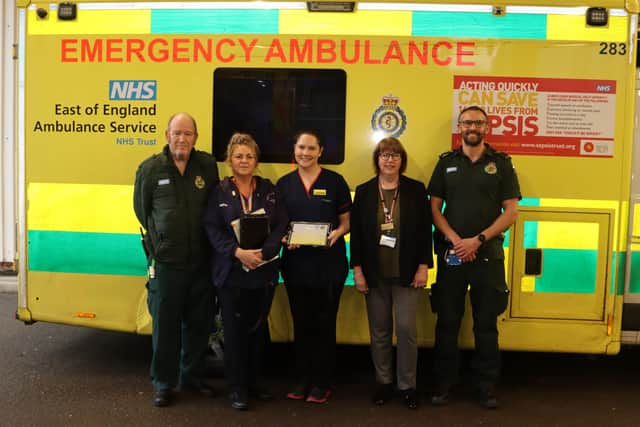Hertfordshire stroke patients receive fast-track care thanks to new video assessment system
and live on Freeview channel 276
Remote video assessments are helping stroke patients in Hertfordshire access swifter life-saving treatment.
West Herts Teaching Hospitals NHS Trust (WHTH) partnered with the region’s ambulance service to launch a pilot video assessment programme at Watford General Hospital.
Advertisement
Hide AdAdvertisement
Hide AdAnd since its launch in December, the programme has helped 20 stroke patients.


The system allows ambulance crews to assess suspected stroke patients by linking with a stroke specialist at Watford General via a tablet.
The joint assessment ensures patients are taken to the right place first time for treatment, meaning stroke patients can go straight to specialist care in a hospital without the need for an assessment in the emergency department.
Stroke specialists can also request imaging and tests prior to the patient’s arrival, to allow earlier treatment and improved patient outcomes.
Advertisement
Hide AdAdvertisement
Hide AdDr Tolu Adesina, consultant stroke physician, said: “This innovation is helping ensure that patients can be taken directly for urgent scans, increasing the speed in which they receive stroke intervention treatment and reducing handover times from the paramedic staff. We have found this an extremely useful innovation, with one patient being scanned within two minutes of arrival.”
Stroke patients are also receiving hyper acute stroke care sooner. This is the intensive care a patient receives in a stroke ward for the first 72 hours post-stroke with higher levels of monitoring.
Karyn Butchard, lead stroke nurse specialist at WHTH and clinical lead for the project, added: “Following the video assessment, if a stroke is suspected, the patient is met on arrival at the emergency department by the stroke team and taken directly to CT scanning – sometimes being scanned within minutes of arrival. WHTH was the first trust in the region to have adopted a nurse-led approach where skilled stroke nurse specialists triage and facilitate the prompt imaging and further assessments for patients on arrival.”
The programme, which EEAST has already been running in other areas of the East of England region, has seen 60 per cent of patients pre-booked into specialist stroke care for a scan or other assessment.